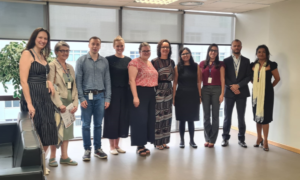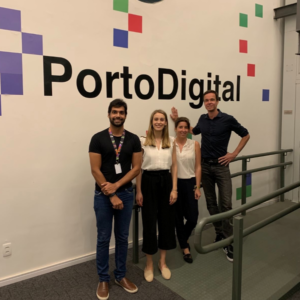The research team on Sustainable Digitalisation in Brazil’s civil service, has just finished its data collection phase. The group is now about to start analysing the information obtained in different research sites throughout the country in the past five weeks.

The team had started its research trip in Rio de Janeiro in February, where the Escola Brasileira de Administração Pública da Fundação Getulio Vargas (FGV EBAPE), one of the two project partner institutions, is based. For first local insights into digitalisation and how it is linked to sustainability, the team met with different experts and advisors to discuss current trends and endeavors in both fields. While doing so, it stayed in close exchange with FGV EBAPE to ensure the relevance and proper embeddedness of the research in the local context.
The team then travelled to the capital Brasília to explore the research topic at the federal level in more depth. Assuming that civil servants hold a highly relevant position with regards to steering political processes in favour of sustainable digitalisation, it predominantly focused on representatives of different federal institutions based in Brasília to conduct semi-structured interviews, focus group discussions, and a participatory workshop. Interviews were conducted with representatives of the Ministry of Management and Innovation in Public Services, the Ministry of the Environment, the Ministry of Education and the Ministry of Labour. Further, state bodies and companies devoted to both environmental and digital matters were also interviewed. During this research phase, the close cooperation with the Escola Nacional de Administração Pública (ENAP), the second partner institution, based in Brasília, facilitated not only the exchange of relevant information but also the establishment of contacts for interviews. Through this, the research team was able to gain a comprehensive overview of the different perspectives of and experiences with sustainable digitalisation at the federal level in Brazil.

For the concluding data collection period, the team split up into two groups, with one sub-team travelling to Curitiba and the other travelling to Recife to further explore sustainable digitalisation at the municipal level in different socio-economic setups. Talking not only to municipal governments and city halls but also to enterprises devoted to technology and digitalisation, both sub-teams obtained further insights to complement the research findings made at the federal level.
Now, the team has reunited to enter the last phase of the fieldwork period in Brazil: data analysis. During a three-week retreat in Paraty, it will transcribe, code, and discuss the data collected on site in Brazil. To facilitate this process, a two-day workshop with key contributors to the research will be held at the beginning of April. By presenting and discussing preliminary results, it aims to receive the feedback of an external sounding board to guide not only the final presentation in Rio de Janeiro, planned for April 13, but also the finalisation of the study back in Bonn.

Schreibe einen Kommentar